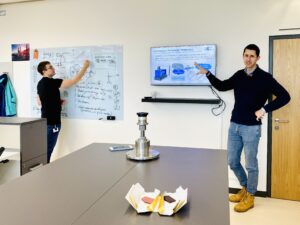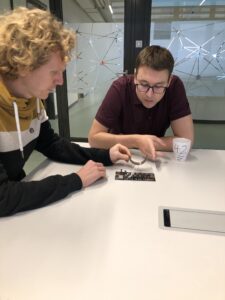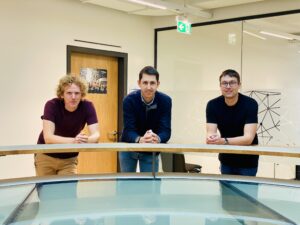LEC engineers shape the future #5: The area “Data Analytics and Controls” introduces itself 😃
LEC engineers shape the future #5: The area “Data Analytics and Controls” introduces itself 😃
In our area, we investigate how digital technologies can improve the performance, durability and robustness of large engines. Our focus is on employing methods from the field of artificial intelligence (AI) and its subfield machine learning (ML) for control systems, condition monitoring and predictive maintenance applications in engine research and development as well as in series engine applications.
“I personally find it very interesting that digitalization and advances in AI methods in particular have created a lot of opportunities for enhancing large engine technology. As the area manager, I have the exciting responsibility of combining a wide variety of disciplines such as mechanical engineering, electrical engineering, computer science and mathematics in our research projects in order to overcome technical challenges.”
👦 Constantin Kiesling
“As a data scientist (mathematician) at the LEC, I find the main challenge is to gain insight into the data obtained during our research engine tests and to process it in a meaningful way using AI or ML methods. The exchange and discussion within the team is especially important to obtain physically meaningful results and to work under realistic assumptions towards series engine applications. It’s great to see that more and more mechanical engineers are getting involved with AI and ML, and I’m always happy to support them with my experience along the entire spectrum of methods, from more easily interpretable statistical regression models to classical ML methods to highly sophisticated neural networks for deep learning.”
👦Christian Laubichler
“I have a background in mechanical engineering and I love the prospect of contributing to the future of internal combustion engines by employing cutting-edge technologies like AI and ML. My tasks range from sketching out prototype part designs on paper to implementing novel sensor concepts for component condition detection to obtaining deeper insight into and setting up data-driven models of the component’s behavior through correlations in the acquired measurement data. My work is the ideal mix of three fields: mechanical engineering, electronic engineering and computer science.”
👦Sven Warter
Would you like to join our team? We have currently advertised several Master’s theses:
👉Development of a data-driven injector model for condition monitoring and advanced control concepts – Large Engines Competence Center LEC | Large Engines Competence Center
👉Analysis of cycle-to-cycle variations in large diesel and dual fuel engines based on an instrumented fuel injection system – Large Engines Competence Center LEC | Large Engines Competence Center
👉 Development of a data-driven damage model for large engine on-board in-cylinder pressure transducers – Large Engines Competence Center LEC | Large Engines Competence Center
In our research area, we also organize the “LEC Data Challenge” every two years. In this competition, we want to encourage data-enthusiastic students and practitioners from various disciplines to develop solutions for a specific machine learning-related task in the field of large engines. The next LEC Data Challenge will be started in early 2025. Until then, here’s the 2023 Data Challenge recap:
#LEC #employees #teamwork #efuels #ammonia #hydrogen #Graz #greentech #greenenergy #greentransport #climategoals #data challenge #forschungwirkt




